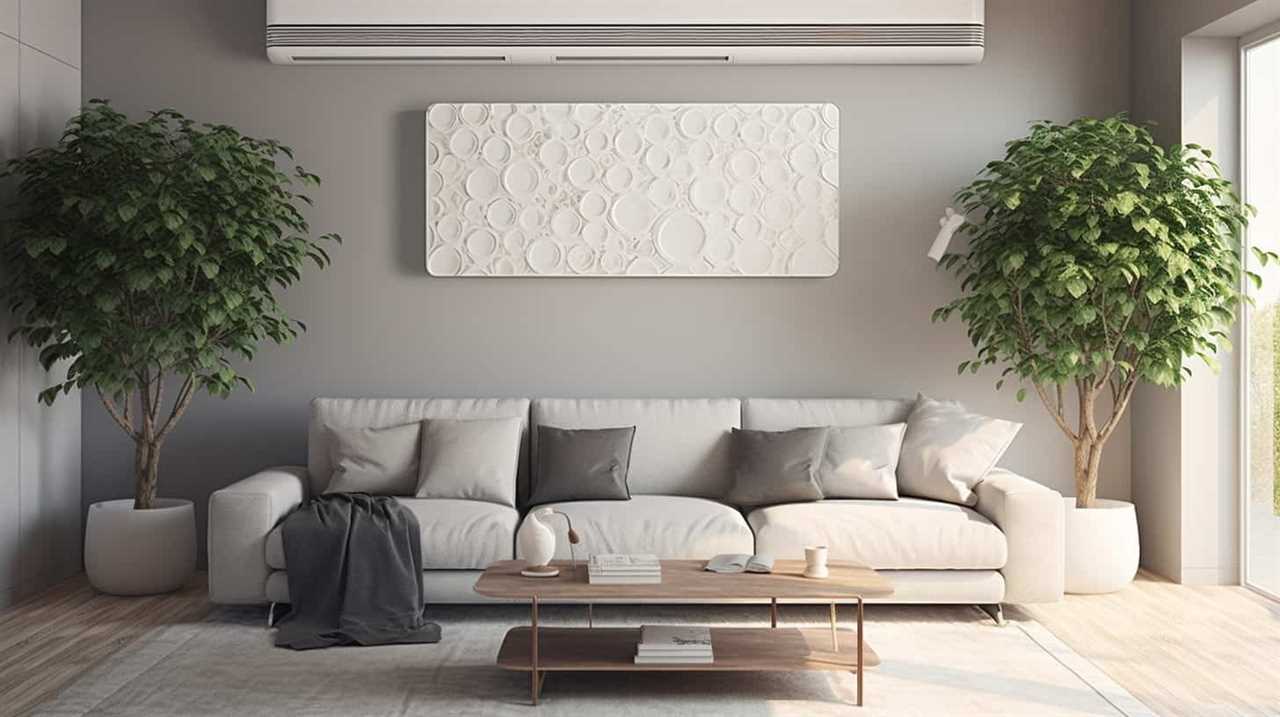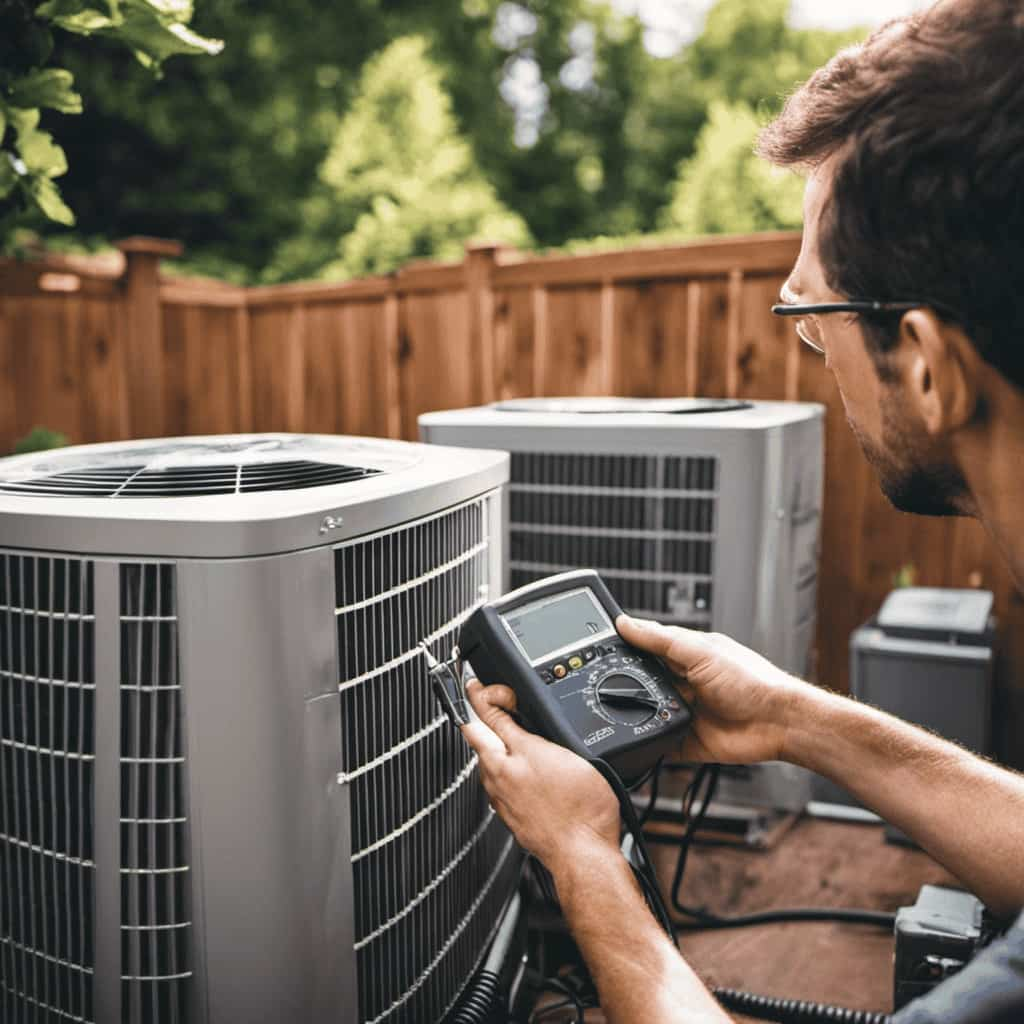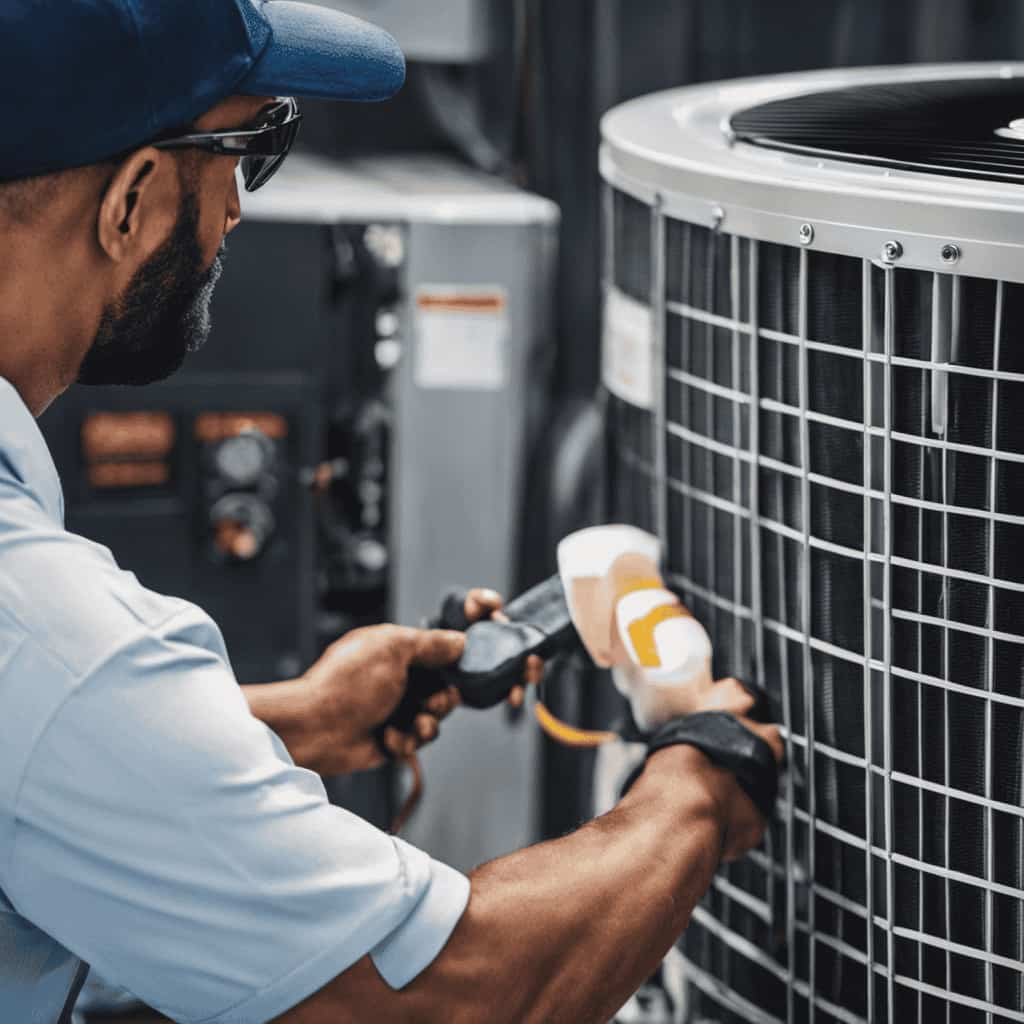Are you exhausted from constantly rising energy bills? Search no more! We have the perfect solution to reducing energy expenses with a breakdown of different heat pump types.
From comparing energy efficiency to understanding electricity consumption, we’ve got you covered. Plus, we’ll share energy-saving tips and show you how to maximize efficiency with the right heat pump type.
Say goodbye to wasted energy and hello to savings!
Key Takeaways
- Geothermal heat pumps and air source heat pumps are both environmentally friendly and can significantly lower energy costs.
- Geothermal heat pumps can reduce energy consumption by up to 50%.
- Air source heat pumps are less expensive to install compared to geothermal heat pumps.
- Regular maintenance and proper installation can impact the efficiency of a heat pump.
Types of Heat Pumps for Efficient Energy Usage
What are the types of heat pumps that we can use to maximize energy efficiency?

There are two main types: geothermal heat pumps and air source heat pumps.
Geothermal heat pumps use the earth’s natural heat to provide both heating and cooling. They work by extracting heat from the ground during the winter and transferring it into the building, and vice versa during the summer. These pumps are highly efficient and can reduce energy consumption by up to 50%.
On the other hand, air source heat pumps extract heat from the air outside and transfer it into the building. They’re less expensive to install compared to geothermal heat pumps, but they’re also slightly less efficient.
Both types of heat pumps are environmentally friendly and can significantly lower energy costs, making them a great choice for those seeking energy efficiency.

Comparing Energy Efficiency of Different Heat Pump Models
When comparing energy efficiency of different heat pump models, we should consider factors such as SEER (Seasonal Energy Efficiency Ratio) ratings and HSPF (Heating Seasonal Performance Factor) ratings. SEER ratings measure the cooling efficiency of the heat pump, while HSPF ratings measure its heating efficiency. Higher SEER and HSPF ratings indicate greater energy efficiency.
However, it’s important to note that other factors can also affect the overall efficiency of a heat pump. Regular heat pump maintenance, such as cleaning or replacing air filters, checking refrigerant levels, and ensuring proper airflow, can significantly impact its efficiency.
Additionally, factors such as the size and insulation of the home, climate conditions, and the quality of installation can also affect the performance and energy efficiency of a heat pump.
Considering these factors when comparing heat pump models can help homeowners make informed choices in reducing their energy costs.

Understanding the Electricity Consumption of Heat Pump Types
To understand the electricity consumption of heat pump types, we need to analyze their energy usage and efficiency. Conducting an electricity consumption analysis can help us determine the factors affecting energy usage and how to optimize efficiency.
There are several key factors that influence the electricity consumption of heat pumps. Firstly, the size and condition of the space being heated or cooled play a significant role. Larger spaces may require more energy to maintain the desired temperature.
Additionally, the insulation of the building and the climate in which it’s located impact energy usage. Heat pumps are more efficient in moderate climates compared to extreme hot or cold regions.
Lastly, the type and model of the heat pump itself also affect electricity consumption. Understanding these factors can help homeowners make informed decisions to minimize energy costs while maintaining a comfortable indoor environment.

Energy Saving Tips for Heat Pump Owners
We can maximize our energy savings as heat pump owners by regularly maintaining and cleaning our units. Here are some energy-saving tips to help you get the most out of your heat pump:
-
Schedule regular heat pump maintenance: Regular maintenance can help keep your heat pump running efficiently and prevent potential issues. Make sure to clean or replace air filters, check refrigerant levels, and inspect the outdoor unit for debris.
-
Use a programmable thermostat: A programmable thermostat allows you to set different temperatures for different times of the day, optimizing energy usage. Set lower temperatures when you’re away or asleep and higher temperatures when you’re at home.
-
Seal air leaks: Inspect your home for air leaks around windows, doors, and vents. Sealing these leaks can prevent heat loss, reducing the workload on your heat pump.

-
Keep the outdoor unit clear: Ensure that the outdoor unit is free from obstructions such as bushes, leaves, or debris. Adequate airflow around the unit improves its efficiency.
Maximizing Energy Efficiency With the Right Heat Pump Type
We can achieve maximum energy efficiency by choosing the right heat pump type for our needs. One way to do this is by opting for energy-efficient heat pump technology. These heat pumps are designed to consume less energy while still providing the necessary heating and cooling for our homes. By investing in an energy-efficient heat pump, we can significantly reduce our energy consumption and lower our utility bills.
Another way to maximize energy efficiency is by taking advantage of the benefits of heat pump zoning. Heat pump zoning allows us to control the temperature in different areas of our home independently. This means we can avoid wasting energy by heating or cooling unused rooms. By implementing heat pump zoning, we can optimize our energy usage and minimize our environmental impact.
Frequently Asked Questions
How Do Heat Pumps Work in Extreme Weather Conditions?
In extreme weather conditions, heat pump performance may be affected by the impact of extreme temperatures. It’s important to consider the efficiency and capacity of the heat pump to ensure optimal performance and energy savings.

Are There Any Government Incentives or Rebates Available for Installing a Heat Pump?
Yes, there are government incentives and rebates available for installing a heat pump. These incentives can help offset heat pump installation costs, making it more affordable for homeowners to save on energy expenses.
Can I Use a Heat Pump for Both Heating and Cooling Purposes?
Yes, we can use a heat pump for both heating and cooling purposes. Heat pump efficiency depends on proper heat pump installation, which ensures optimal performance and energy savings for both heating and cooling.
What Maintenance Is Required for Heat Pumps to Ensure Optimal Energy Efficiency?
To ensure optimal energy efficiency, heat pump maintenance is essential. Regularly cleaning or replacing filters, inspecting and cleaning coils, and checking refrigerant levels can help keep your heat pump running efficiently and save on energy costs.
Are There Any Potential Health or Safety Concerns Associated With Using a Heat Pump?
Health concerns and safety precautions related to heat pumps are important to consider. We found that regular maintenance, like changing filters and cleaning coils, can prevent potential issues and ensure safe operation.

Conclusion
In conclusion, choosing the right heat pump type is crucial for cutting energy costs and maximizing energy efficiency.
According to recent studies, air source heat pumps have an average coefficient of performance (COP) of 2.5 to 4, meaning they can produce 2.5 to 4 units of heat for every unit of electricity consumed.
This statistic highlights the significant energy-saving potential of heat pumps and emphasizes the importance of selecting the most efficient model for your home.









